One of the most common questions we hear from clients is, “What’s the difference between bookkeeping and accounting? Is there a difference at all?” The answer is yes, there’s a big difference. Accountants are able to provide a wider range of financial services. They can implement accounting software and modify accounting processes that have long-term effects. Whereas bookkeepers will strictly focus on data entry. They will enter, store, and record your financial data.
Although the terms are sometimes used interchangeably because bookkeepers and accountants share common goals, they refer to two different kinds of financial services. Let’s dive into key differences.
What is Bookkeeping?
Accurate bookkeeping is the cornerstone of any successful company. The bookkeeping process refers to the daily recording, storing, and retrieving of day-to-day financial transactions for your business (in QuickBooks or other software). The most common business transactions include:
- Purchases: This involves recording all the purchases your business makes, whether they are supplies, inventory, or other operational costs. Accurate recording ensures that you can track expenses and manage budgets effectively.
- Sales: Bookkeepers track every sale made by the business, recording the revenue generated. This helps in maintaining accurate income statements and understanding the financial performance of your business.
- Receipts: Recording receipts is crucial for tracking cash flow. It includes documenting all money received by the business, whether from sales, loans, or other sources.
- Payments: All outgoing payments, including bills, salaries, and other expenditures, are recorded. This helps in managing liabilities and ensuring that all financial obligations are met on time.
- Invoices: Bookkeepers handle the creation and tracking of invoices. This ensures that clients are billed correctly and payments are received promptly, maintaining a healthy cash flow.
In general, bookkeepers are required to have at least 2-4 years of experience or an associate’s degree in the field. Bookkeepers need to focus on accuracy and be fluent in key financial topics. In most cases, the bookkeeper’s work is overseen by an accountant.
Many business owners who aren’t sure which service to choose start with bookkeeper records, and then add on accounting services as their business grows.
What is Accounting?
While bookkeeping simply involves recording your business’ financial transactions, accounting services take things a step further and also include interpreting, classifying, analyzing, reporting, and summarizing your financial data.
That means accountants won’t just record your numbers and send you a financial report — they actually review and analyze everything and tell you what it all means and what you should do with that information. Accountants provide higher-level financial services than bookkeepers
Depending on your specific needs, accounting services can include things like:
- Financial Statements: Accountants prepare comprehensive financial statements, including balance sheets, income statements, and cash flow statements, providing a complete picture of your business’s financial health.
- Classification: Accountants classify and categorize financial data, ensuring that all transactions are recorded correctly and consistently, which is crucial for accurate reporting and analysis.
- Bank & Credit Card Reconciliations: This involves comparing your internal records with bank statements to ensure that all transactions are accounted for and to identify any discrepancies.
- Analyzing Sales Data & Stats: Accountants analyze sales trends and statistics to help you understand your business’s performance and identify areas for improvement.
- Financial Projections: Accountants create financial projections to help you plan for the future, make informed business decisions, and secure funding or investment.
- Cash Flow Management: Effective cash flow management ensures that your business has enough liquidity to meet its obligations and invest in growth opportunities.
- Consulting & Training: Accountants provide consulting services and training to help you understand your financial data and implement best practices for financial management.
Accountants usually have a degree in accounting or a related financial field, and can also get additional certifications (like a CPA). To become an eCommerce CPA, an accountant must pass the Uniform Certified Public Accountant exam and have experience as a professional accountant.
Bookkeeping vs. Accounting Differences
Though bookkeeping and accounting complement each other, they’re not exactly the same thing, so the difference between accounting and bookkeeping is worth noting. Both are crucial for the financial health of a business, but they serve different purposes and require different skill sets.
Focus and Scope
- Bookkeeping is primarily concerned with the accurate recording of financial transactions on a daily basis. It focuses on the day-to-day management of financial data, ensuring that all transactions are documented and organized.
- Accounting takes the information recorded by bookkeepers and goes further by analyzing, interpreting, and summarizing it. Accountants provide insights and financial advice based on this data, helping business owners make informed decisions.
Skills and Qualifications
- Bookkeepers often need to have a good grasp of financial topics and attention to detail. They typically have at least an associate’s degree or relevant experience.
- Accountants generally have more advanced education, often holding a degree in accounting or a related field. Many accountants also pursue certifications such as the CPA, which require passing rigorous exams and meeting professional experience requirements.
Responsibilities
- Bookkeepers handle tasks such as recording purchases, sales, receipts, payments, and invoices. Their role is to maintain an accurate and up-to-date record of all financial transactions.
- Accountants perform more complex tasks such as preparing financial statements, conducting audits, analyzing financial data, creating financial projections, and providing strategic financial advice.
Decision-Making
- Bookkeepers provide the data needed for decision-making but do not typically engage in the analysis or strategic planning.
- Accountants use the data provided by bookkeepers to analyze and interpret financial information, offering insights and recommendations for business strategy and growth.
Which Is Right For You?
In general, the larger or more complex your business is, the greater the need for both an expert bookkeeper and a certified accountant. Many smaller businesses begin with bookkeeping services, and then add other accounting services as they grow.
Bookkeepers and accountants work in tandem to give you a complete financial picture: Bookkeepers look to the past, while accountants look to your financial present and future. Together, they can provide you with the sound financial information and advice you need to make good decisions for your business.
In the end, the most important thing is that someone with experience and expertise in handling your finances–you can’t afford to just wing it! Unless you’re an accountant yourself (and most business owners aren’t), you shouldn’t try to handle your own books or accounting needs. Not only will it eat up your precious time, but without a sound accounting background, it’s easy to get lost amid a sea of paperwork and reports. Ultimately, your business will suffer (not to mention your stress level).
Top Financial Accounting Services From Fully Accountable
Understanding the differences between bookkeeping and accounting is essential for effectively managing your business’s finances. Bookkeeping lays the foundation by accurately recording daily transactions, while accounting builds on this foundation by analyzing and interpreting the data to provide valuable insights and strategic advice. Both roles are vital and complement each other to ensure the financial health of your business. As your business grows, having both skilled bookkeepers and experienced accountants on your team can make a significant difference in achieving long-term success.
Ready to take control of your finances and set your business up for success? Fully Accountable is here to help with comprehensive accounting and financial services. Contact us or schedule a call today to learn more about how we can support your business’s financial health and growth.
–––––––––––––––––
Chris Giorgio, President
Fully Accountable is a full-service accounting and bookkeeping solution that provides all the benefits of an in-house department with none of the overhead. With services like daily feedback, your own CFO, profit & loss analysis, and more, you’ll have the financial information you need to make informed, strategic decisions for your business. To learn more, visit https://fullyaccountable.com/ or schedule a 30-minute strategy call.

